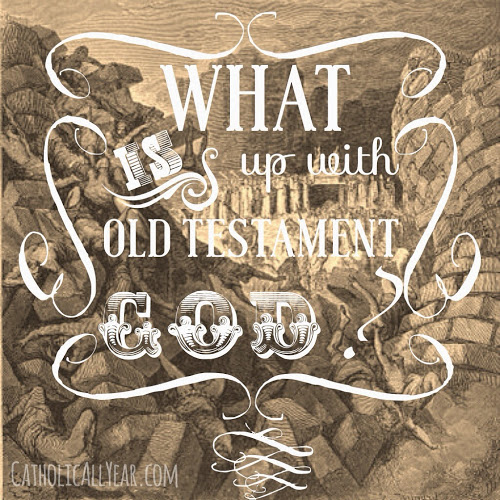I’ve got a couple more mailbag questions I want to share with you guys this week. The first is one I really struggled with myself.
Question:
I was raised Catholic, but apparently, there is a lot about our faith I was never taught. Now that I’m raising children, I am working hard to learn more about our beautiful faith so that I can live it for them. I take my responsibility to raise my children in the faith seriously. Anyway, so the question is, how do you explain some of the darker passages of the Bible (you know, the parts of the Old Testament that make God out to be evil) to your children? My oldest is 3, almost 4, so in particular I want to know how to address it with him when we’re reading passages from his children’s Bible.
Answer:
I remember reading the story of Jericho to my daughter Betty. It ends: So the people shouted, and the trumpets were blown. As soon as the people heard the sound of the trumpets, they raised a great shout, and the wall fell down flat; so the people charged straight ahead into the city and captured it. 21 Then they devoted to destruction by the edge of the sword all in the city, both men and women, young and old, oxen, sheep, and donkeys.
And Betty looked up at me with her big five year old eyes and asked, “Is that GOOD?”
I didn’t know WHAT to say.
Since then, I’ve looked into it.
This is what Pope Benedict said on the subject:
“Here it must be remembered first and foremost that biblical revelation is deeply rooted in history. God’s plan is manifested progressively and it is accomplished slowly, in successive stages and despite human resistance. God chose a people and patiently worked to guide and educate them. Revelation is suited to the cultural and moral level of distant times and thus describes facts and customs, such as cheating and trickery, and acts of violence and massacre, without explicitly denouncing the immorality of such things. This can be explained by the historical context, yet it can cause the modern reader to be taken aback, especially if he or she fails to take account of the many “dark” deeds carried out down the centuries, and also in our own day. In the Old Testament, the preaching of the prophets vigorously challenged every kind of injustice and violence, whether collective or individual, and thus became God’s way of training his people in preparation for the Gospel. So it would be a mistake to neglect those passages of Scripture that strike us as problematic. Rather, we should be aware that the correct interpretation of these passages requires a degree of expertise, acquired through a training that interprets the texts in their historical-literary context and within the Christian perspective which has as its ultimate hermeneutical key “the Gospel and the new commandment of Jesus Christ brought about in the paschal mystery”.
(Found in paragraph 42 of this document.)
So, in layman’s terms, what Pope Benedict XVI is telling us is (I think):
- God, in his love, slowly revealed his nature to man, in a way we could understand.
- The people may have celebrated wrong-doing but God and his prophets did not.
- The Old Testament tells us about God, not from God’s perspective, but from man’s. God is unchanging, but man has changed. We have a greater depth of understanding of God’s love and mercy than we did when the Old Testament was written, because we have the benefit of the words, example, and redemption of Christ.
- We know that the promises of the Old Testament are fulfilled in the New Testament. We know that the story has a happy ending.
So, next year, when Anita is in Kindergarten and we read the story of Jericho together, I’ll tell her: No. It was not a good thing that all those people were killed. It was a sad thing. It is sad for us, but it’s even sadder for God, because God wants all people to love him and be able to live with him forever. The people in Jericho were bad guys. God gave them the chance to repent and be saved, but only Rahab and her family loved God and asked for forgiveness. So, they were saved. But in the time of the Old Testament, it wasn’t possible for the winners of a war to put all of the bad guys in jail. They had to kill them or the city would have had more bad guys than good guys. The Israelites rejoiced when they won, but God didn’t rejoice that all those people had to die. When we really think about it, it’s much sadder when bad guys die than when good guys die. God loved all those bad guys, but they didn’t love him back, and that’s the saddest part of all.
Thanks to Michael, who emailed me a great article by Fr. Robert Barron. The whole thing is worth a read. But the paragraph that is perhaps most relevant to our discussion today is this:
A third perspective—and to my mind the most important—is that the violent passages of the Bible ought to be read as spiritual metaphors, tropes for the terrible struggle between the ways of God and the ways of sin. Origen long ago commented that, in many of the biblical stories, the Israelites should be appreciated as evocative of all that is congruent with the will of God and that the enemies of Israel—Amalekites, Egyptians, Assyrians, Babylonians, Greeks, and Romans—symbolize all that stands athwart the divine purposes. A strong indication within the Bible itself that Origen is on to something is the conclusion of the great story, in the book of Exodus, of the Israelites’ battle against the Amalekites: “The Lord will war against Amalek through the centuries” (Ex. 17:16). On the assumption that the tale from Exodus is simply a straightforward historical account of Israel’s struggle against a petty ancient middle eastern tribe, that claim makes little sense. And with this more metaphorical reading in mind, we can make much better sense of Saul’s fall from grace. By refusing to put the ban on Amalek, Saul was playing games with evil, indeed using evil for his own purposes. Consider the manner in which we typically deal in half-measures with evil, toying with it, using it in fact to our advantage, when we should simply be eliminating it. I’m quite sure that a man’s AA sponsor would be less than satisfied upon hearing that his charge was taking only one drink a week and that a wife would be anything but delighted to hear that her husband was faithful to her 90% of the time. Certain forms of evil are so repugnant to human flourishing that they simply have to be eliminated. The ban must be placed on them. Saul spared the Amalekite king Agag, but the prophet Samuel, as the Bible not so delicately puts it, “hacked Agag to pieces” (Ex. 15:33). Read in a purely literalistic way, this passage is brutal indeed; but read metaphorically and spiritually, its depths open up: sometimes hacking evil to pieces is the only proper measure.
Much of the confusion comes from the sense many of us have that we must interpret all of the Bible in exactly the same way. But, as Fr. Barron points out so eloquently earlier in this same piece, the Bible is a library not a book. It’s full of different genres of literature that must be interpreted different ways. SOME of the Bible is to be interpreted literally. SOME of it isn’t. As with most of Catholic teaching, it’s not black and white. It’s nuanced. We are mostly not a religion of either/or we are both/and. Sometimes that makes things easier on us, but it also makes it more complicated, and puts a lot of responsibility on each of us!
Disclaimer: I am not a theologian, nor am I an official spokesperson for the Catholic Church. (You’re thinking of this guy.) If you read anything on this blog that is contrary to Church teaching, please consider it my error (and let me know!). I’m not a doctor or an expert on anything in particular. I’m just one person with a lot of experience parenting little kids and a desire to share my joy in marriage, mothering, and my faith.
If you’ve got a question, please send it along to catholicallyear @ gmail . com . Please let me know if you prefer that I change your name if I use your question on the blog.




This is really really helpful. A lot of things in the Old Testament are incredibly disturbing and disgusting and tragic. It is so hard to understand. I always find it funny that Noah's Ark is considered a children's story when pretty much the entire world, save one family, dies. Whenever I'm reading that one to the kids, it's so sobering! Not gonna lie, sometimes I wish God had laid things out more clearly in the Scriptures. There's obviously a reason He did things the way He did but I in my own little human brain feel like it could've avoided a lot of problems if Christ had said, "no, REALLY, I'm going to establish a real church." Or "hey, in the future you guys might think I mean this, but I really do mean THIS."
Now if I could just commit that explanation to memory…
Great answer. I always come back to our Lord, Jesus, saying you have heard "an eye for an eye and a tooth for a tooth, but I tell you" now that this is no longer the way…or something like that. The whole idea of forgiving your enemy and turning the other cheek…
Can you give me the source of Pope Benedict XVI's to which you referred? I'd like to read more on this subject. It is a troubling one. The Calvinist understanding that I grew up with taught that because God is sovereign and good, whatever He ordains must be good, even if it looks to us like evil. So if he told them to wipe out a city, it must have been good and holy to do so (in that instance). To me, that leaves a door open which is very dangerous. Anyone can claim that "God told me to go bomb that abortion clinic," and can claim that taking the life of a bad guy is just an instance of doing what God ordained back then.
I added the link up there in the text Jenny, along with a link to a great piece by Fr. Robert Barron that basically touches on everything that's possibly problematic to people coming into the Catholic Church!
The interpretation you mention seems really problematic to me also. For the reason you mention, but also because it seems to me to turn God into a being that doesn't make sense. That's not how Catholics see him. Our understanding is that since God is good and the Bible is true, if it looks like God is commanding evil, it's because there has been a misunderstanding somewhere along the line.
Either the Isrealites misunderstood, or the writer is emphasizing or interpreting it a certain way, or we are misreading the text, expecting it to be historical when in fact it's symbolic.
God is good, the Bible is true, if something is messed up, it's with the people!
Thanks! Love that Fr. Robert Barron! In C.S. Lewis's book "Perelandra," the protagonist Ransom must fight and kill a man possessed by Satan in order to save another planet from falling into sin. As he's grappling with the "un-man" he speaks of feeling a "perfect hatred" because he has encountered something which is so inhuman and so completely given over to Satan that it is completely right for him to kill it and save the ones it is trying to kill. Maybe this is along the same lines as what Fr. Barron is talking about…
So would we say God found it necessary but not ideal? He was raising up Man (as a species) to go away from this violence but His Holiness demanded the death of the people and animals to show Israel how thoroughly they must turn away from evil?
It's so confusing.
It is confusing Amanda. One possibility is what Fr. Barron mentions in the passage I added above, that those races should be seen to stand for evil, and that we are not meant to understand that God was ordering the killing of anyone.
Two things: One, a good friend of mine who is Jewish asked me some really tough questions about Evangelical Christianity and how we explain bad things that happen, such as babies dying and things like that. I never felt like I sufficiently answered the question to his liking because to have faith that God is inherently good and therefore all things that He does are ultimately for good requires a level of faith and a relationship with Christ that he did not possess. Which leads me to two: how do you feel about the war between Israel and Hamas/Palestine? I keep seeing news reports about how mean those big bad Israelis are to be killin' innocent children and stuff and yeah, that's mean but the truth is that Hamas is putting their own innocent children up as human shields and operating from places like schools so that Israel has to bomb there or else their own innocent children will be bombed. But again, understanding Israel's right to exist requires a certain level of Old Testament knowledge that the news media and general populace don't have. Just interested in your perspective.
I don't know Heather. That's an extremely difficult question. The just war doctrine does allow for war and for killing in self defense and in defense of one's country. It seems like Israel has been fighting to survive for 10,000 years straight. I'm not sure what the solution is.
I wish I had some answers for the Israel/Hamas issue, but I am stuck there, too.
But, Meg posted recently on the topic of suffering and nicely articulated something I had been trying to articulate for months. The standout phrase to me is (paraphrasing) "all of the suffering and bad things happening to good/innocent people would seem unfair or seem to point to an unloving God, if this world were all there was. But it isn't." Anyway, check out Meg's post, it really helped me out with that:
http://www.piercedhands.com/face-suffering-we-live-hope/
I think the idea basically is that Israel would lay down their arms if the entire rest of the middle wat wasn't trying to completely eradicate them. Israel has offered peace but the rest of the Middle East refuses, wanting only to wipe the state of Israel off the face of the earth. So, they fight. Israel was able to make peace with Egypt some time ago I believe, and gave them a large tract of land in the treaty. Not sure as to the current state of affairs between them. Basically though Israel would cease to fight if there weren't several countries trying to kill them.
Edit to the above… This website is a good yet simple explanation of the Israel and Palestine problem. http://www.vox.com/2014/7/17/5902177/9-questions-about-the-israel-palestine-conflict-you-were-too
I love this, Kendra. My son is 5 and in reading stories like this, he seems to just accept that if people are naughty they get punnished, and he doesn't question much more than that.
I wonder if I am doing him a desserivce to not show him a different angle? Do you think this is an okay understanding for a 5 year old to have?
I think, eventually, a better understanding to have is that sin itself is what causes suffering, rather than God doling out punishments.
One way I've heard to look at it is this: God had to speak to the people in a way they could understand. War was very much the language of the time. In order for them to take over the promised land, they had to deal with the people there. These people were not going to change their ways nor allow the Israelites to rule them, so they chose to fight. God and the Israelites both knew war was the only way to defeat the evil of these people. "A man chooses his path, but The Lord directs his steps." The men of the time choose the culture of war but God directs them in a way to achieve His kingdom. It still leaves a lot if questions, like why didn't God choose a land with no people to conquer, etc. But it helps. We all choose our own path and God meets us where we are to direct our steps ultimately for His glory.
"God had to speak to the people in a way they could understand."
Indeed. God has a history of doing this. One of the more interesting examples, in my opinion, is the Star of Bethlehem, if this guy's research(*) is accurate.
In short, in Jesus's day apparently the science of astronomy had some astrology blended in with it, so practitioners interpreted things about the world from what they saw in the sky – most famously, Jesus's birth ("Where is the king? We saw his star in the east."). To me, the idea that God spoke to people using astrology at a certain time and a certain place is fascinating.
(*)http://www.bethlehemstar.net/
Didn't ever get much from the Other growing up in the 1960s from Catholic education. I gave have read more later it does sound like a vengeful God unless it is put in perspective. I have done several Bible studies and these reflections are some of the best for understanding the life and times of the Israelites and their One God.
Thanks for this post and the link to Barron's article. You answered questions I hand't really formed yet.
Hi Kendra, I think this is a really important conversation because it points to the differsnces in the Bible and the holy book in the Muslem religion.
We should not read the Bible as if every word is a direct quote from God. As you pointed out, all the books are written differently and for different reasons. Sometimes God does speak to us directly (the Gospels) some books are quoting humans who are quoting God, and in some books God is speaking to us through a peoples understanding of their own history. ( We could reasonably understand that on God used the Allied forces to conquer evil, without saying that Our Lord caused, commanded, or rejoiced in the war.)
I think it's also important to remember that we are talking about a really inhospitable environment. All the good places to live would have been the most populated. Any place "flowing with milk and honey " would have been fought over and defended vigorously .
Thanks so much for your blog:) I have enjoyed reading it .